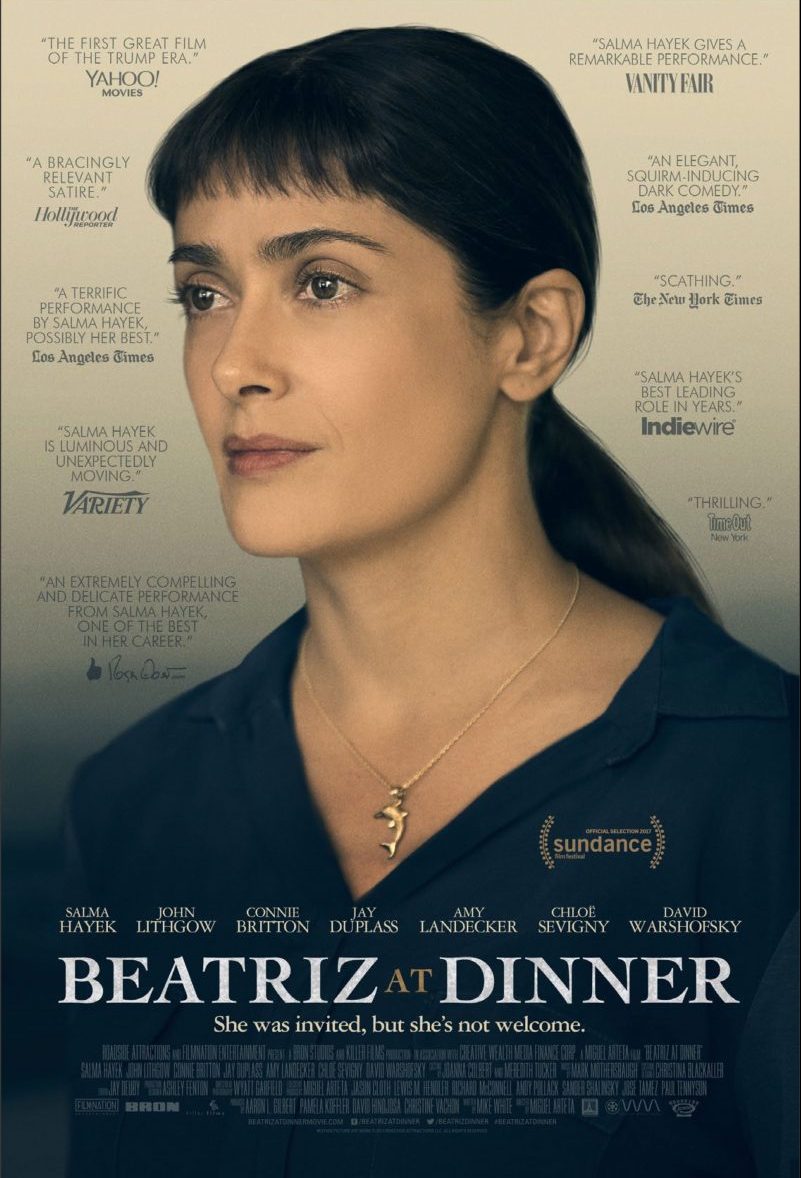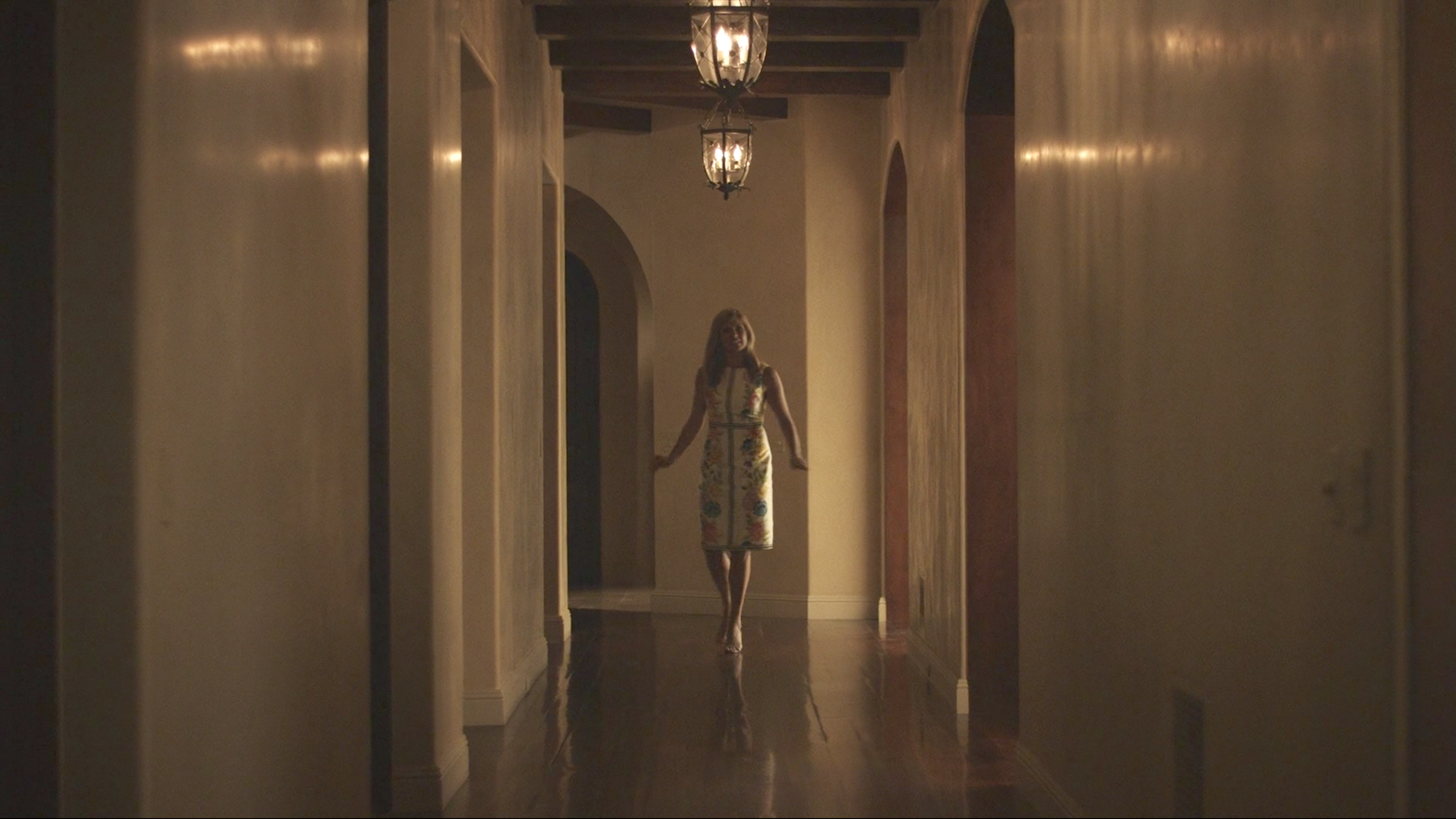The Furniture: Beatriz at Dinner in a Tacky Muted Mansion
 Monday, September 18, 2017 at 2:10PM
Monday, September 18, 2017 at 2:10PM "The Furniture," by Daniel Walber, is our weekly series on Production Design. You can click on the images to see them in magnified detail.

Beatriz at Dinner is a film of climaxes, moments of outrage that burst through the veneer of respectability cultivated by the rich and amoral. Beatriz (Salma Hayek), overwhelmed with disgust at a picture of Doug (John Lithgow) and the body of a recently-murdered rhinoceros, throws his phone at him and storms out. Laughing at her principles, he looks at his hosts and asks, “Does she get out much?”
This, of course, is a central irony of Miguel Arteta and Mike White’s tightly-wound send-up of American wealth. Doug is the CEO of Rife Worldwide, an internationally-reviled real estate firm. He’s a Trumpian nightmare of toxic masculinity and unbridled capitalism, breaking laws and displacing communities as a best business practice. And so when he asks this question, we are reminded that his life is spent constructing hideous monuments to tackiness that replicate a precise vision of high-end living no matter the context...
His are the affectless hotels of Toni Erdmann and the hideous homes collected by McMansion Hell.
This irony is also endorsed by the editing. His rhetorical question is answered by a smash cut to Kathy (Connie Britton), off to get Beatriz to calm down. She walks down a dismal hallway, an undecorated corridor flanked by gaping doorways, none of them the least bit inviting.
It’s worth pointing out that this is her house, not Doug’s. His is presumably much larger and more hideous, even further from society than Kathy’s gated community in Newport Beach. But such a nightmare might have laid things on a little too thick. And so production designer Ashley Fenton and Madelaine Frezza are tasked with this one instead. Their work is subtly damning, so many pieces of large furniture and so few colors between them. There’s even an out-of-place historical portrait, of the sort one might find in The Oscar.
The living room features an especially innocuous abstract expressionist painting, which takes Beatriz a little off-guard. Actually, that’s a bit unfair to the painting. One gets the sense that it might have more to say in a gallery, but it’s pretty obvious from the decor that it was only purchased to match the throw pillows and the armchairs.
A more direct challenge comes from an enormous mirror, a solitary accusation hovering above a sofa. Beatriz tucks in her shirt, preparing for a cheaply gilded dinner with some expensively gilded people.
Everything is muted, the entire house a sandstone desert, flecked with inoffensive blues. The final painting blends even further into the background than the other two. A forest scene, it gets lost between the candles above the fireplace. These aren’t people who like art, nor are they even people who like owning art. They’re people with a lot of money and too much wall space.
Overtime, this makes the skin crawl. It doesn’t exactly that effect on Beatriz, whose mind is on much more upsetting information. But to the audience, forced to look at the same dim colors for nearly all 75 minutes of the film, it can become a little overwhelming. The chairs begin to blend with the clothes, the napkins with Chloë Sevigny’s hair. The light fixture over the dining room table dangles threateningly over the cast, as if about to extend its tentacles and strangle them all.
Of course, it doesn’t. And the one brief moment of revenge fantasy toward the end of the film turns out to be just that, a fantasy. Beatriz at Dinner tiptoes up to the satirical viciousness of Buñuelian allegory, but never quite crosses the line. The film is perhaps lesser for it, its bite less sharp than required. But the design is hardly timid, and makes up much of the difference.
previous episodes of The Furniture









Reader Comments